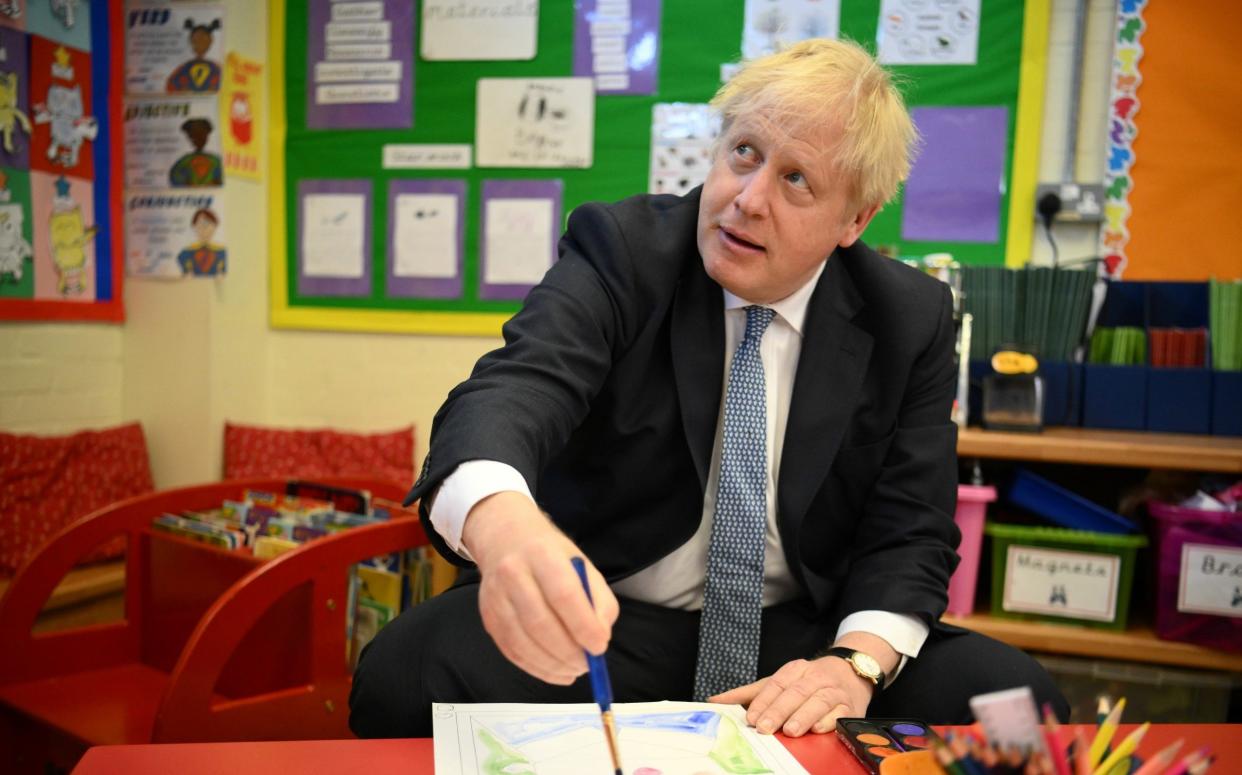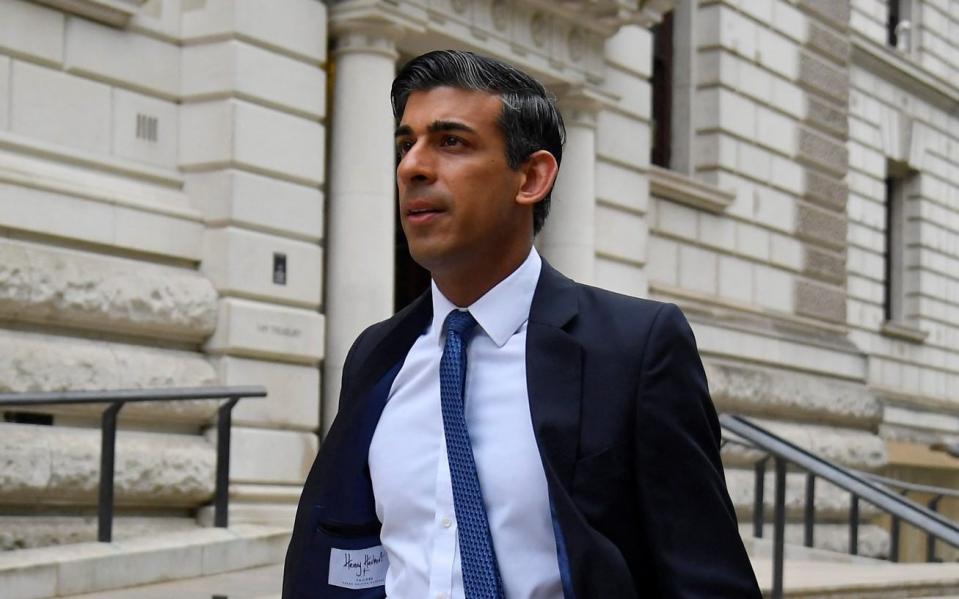‘We can’t heat our food anymore’: Swing voters reveal why they turned against the Tories

- Oops!Something went wrong.Please try again later.
It is 7.30pm on a Wednesday evening and Donna, a 47-year-old care assistant, is sitting in her Wakefield home, wrapped in a shawl.
Like many across the country, she has become acutely conscious of the rising cost of living. Increasing food, energy and diesel prices are already having a significant impact on her day-to-day life.
Energy tariffs that offer cheaper “off peak” rates allow Donna and many others to shift their use of household appliances to the evening, or night time. Other adjustments, though, are more dramatic, like eating significantly less hot food.
“I have noticed it recently,” she said. “My kids have left home and it’s just me and my partner. I’m washing after six now. We don’t really put the heating on. We wrap. If we put the heating on to take the cold out of the air, it’s after six and it’s only for an hour.”
She added: “We’re eating a lot of cold food, so as not to have to cook.”
Donna’s husband has also begun driving their car to work to save on the additional diesel consumed when she used to drop him off each day and then return home.
She is addressing a focus group of nine working-class voters in Wakefield, all of whom describe their own cut-backs, albeit to varying degrees, to reduce costs.
All voted for the Conservatives in 2019, but the majority indicate a disaffection with Boris Johnson which appears to have contributed to the severe losses suffered by the Tories in the council elections.
A similar sentiment was described by some of the Conservatives’ ousted council leaders on Friday.
Tory MPs know that the disaffection that appeared to play out could be highly dangerous for the Prime Minister in a general election, particularly if they considered Sir Keir Starmer to be a better alternative.

Within weeks, the Wakefield voters will be taking part in a by-election sparked by the departure of Imran Ahmad Khan, the Conservative MP convicted of sexually assaulting a boy.
Another group of comparatively better-off voters in north London, who also backed the Conservatives in 2019, express not dissimilar views about Mr Johnson and Sir Keir. Unfortunately for the Labour leader, he remains less popular than Mr Johnson amongst both groups of voters, however low their view of the Prime Minister has been sinking.
The groups were organised by Public First, the influential opinion research firm that has carried out work for Downing Street, and moderated by James Frayne, a founding partner.
In both cases, the rising cost of living is clearly the biggest concern.
“I don’t know anyone who’s not tightening their belts at the moment and trying to make changes to their lifestyles,” said Imran, a school business manager from Harrow, north-west London, where the Conservatives took control of the local council from Labour on Friday.
Felicity, a manager in the public sector, said: “The rich are getting richer and the poor are getting poorer. And us who are in the middle, we’re just holding on, we’re just struggling.”
Felicity, whose son is living with her whilst studying at university, said she is spending much of her time switching off lights in their home and, whilst “the food shop can never go down in our house, it’s Lidl and Aldi and less of the Marks & Spencer [and] Waitrose”.
She added that her son will still likely require help from “the bank of mum and dad” when he graduates, even on the basis that he gets a job with the minimum wage.
“The bank of mum and dad are thinking, ‘God almighty, we’re struggling as it is’,” she said.
Deborah, who works in HR operations, is now using her car only “if I absolutely have to” in order to save money on fuel.
Darena, another middle-aged woman from Harrow who cares for her elderly mother, is using her washing machine and oven only when she has a full load of items for each appliance.
Peter, a 51-year-old social housing consultant in the London focus group, said: “My electricity bill for three months is usually £300 and it was close to £800. It’s an incredible uplift in expenses.”
Steve, a porter from Wakefield, said: “We’ve just started, if the kids get cold, reverting back a little bit, like people used to do back in the day [to] ‘put a jumper on, get a blanket’ or something like that. It’s not instantly, ‘I’ll put the heating on and I’ll warm you up’.”
Jasmine, 36, from Wakefield, who works in healthcare and has a young daughter, said: “I’ve made quite a few changes. Because I drive quite a lot, I’m trying to rely more on car sharing or using public transport and I’m also pushing to work from home a little bit more.
“In terms of my heating, I’ve turned it down by degree and I’m also having it on less. In terms of my washing, I’m trying to reduce the number of loads, trying not to use the tumble dryer. And I’m shopping more at budget supermarkets.”
In only one case across the two groups did a participant say they felt optimistic about the economic situation.
“I’m in a bit of a lucky situation where my mortgage is paid off and I don’t have any loans or anything, so I can weather the storm a little bit,” said Michael, a 48-year-old maintenance engineer from Wakefield. His energy bill has, however, doubled, leading him to turn down his thermostat to 20C.
Generally, the voters in these two groups do not blame the Government for the rise in the cost of living – although some express irritation about its approach to tax, including the National Insurance increase introduced last month.
Darena said: “There are so many, many factors. The oil crisis is one factor, the energy crisis then stemming from that.”
Peter commented: “I just find it so depressing, the whole Rishi Sunak scenario of imposing higher taxes on everybody and then his wife’s non-dom status. I’m a Tory voter, but I am incredibly embarrassed by that front bench.”
Imran said he had previously supported the Conservatives having seen the party as supportive of local businesses, with which his family has been involved for a number of decades.

However, the Government’s response to the cost of living crisis has suggested they are “out of touch”, he said, with a council tax rebate for millions of households failing to compensate for the National Insurance increase and rise in bills.
Mr Johnson’s standing appears to have slipped universally amongst the voters in Wakefield and the London group.
“I liked him as a person previously, I always thought he was a character,” said Deborah. But she put Covid-19 successes such as the vaccine roll-out down to the NHS, criticised fiascos over personal protective equipment for medics, and described the Prime Minister’s overall performance as “abysmal”.
Darena said: “My mum, whenever Boris comes on TV, starts ranting about his hair, and how scruffy it is and what state he looks. I know that that is so superficial and may seem really shallow, but on the world stage, it does matter.”
However, she added: “I don’t know if there’s anyone better, and that’s always the problem, isn’t it? It’s choosing between the plague and another illness.”
Many of those in the groups believed that Mr Johnson should have quit some time ago over the scandal of illicit parties held at Downing Street during Covid lockdowns.
“I think the fact they had parties is ridiculous,” said Vicky, from Wakefield, who works in financial services. “Don’t put yourself in a position of power that you then abuse. That really upsets me. I won’t trust him. I don’t trust him. I think he’s a bit of a joke, to be honest.
“He doesn’t make decisions, it’s quite clear when he’s on TV presenting he hasn’t got a clue what he’s talking about. There’s a lot of people behind him that do all the work.”

But a perceived lack of a convincing alternative to Mr Johnson, whether in the form of Sir Keir or potential Tory leadership rivals, appears to contribute to a view that the time for the Prime Minister to quit has come and gone.
“I think he should have gone, but I don’t think there’s any point in getting rid of him now,” said Vicky. “He’s got away with it. There are other more important things.”
Andy, a 54-year-old builder, said: “I think he ought well to have gone. He’s a lucky man.”
However, Imran disagreed, saying: “I don’t see him there very long. People don’t like the fact that he lied.”
There are also signs of Mr Johnson’s Brexit dividend wearing off, with none of the participants mentioning the issue as one of the Prime Minister’s successes, and two of those in the Wakefield group complaining that he had failed to come good on the Vote Leave pledge to redirect £350 million a week previously spent on the EU, to the health service.
For now, though, those thinking of dropping their support for the Conservatives appear put off from doing so by their view of Sir Keir – who also appears to be struggling to gain the admiration and trust of these voters.
“He doesn’t have charisma or much of a personality,” says Deborah, from Harrow. Felicity said she could “either take him or leave him”, and bemoaned the “school playground” of politics in the House of Commons.
Peter adds: “I don’t like him at all. The Labour Party are just as bad.”

